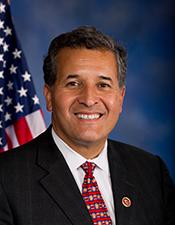0
0
0
Recognizing the duty of the Federal Government to create a Green New Deal.
12/15/2023, 3:51 PM
Summary of Bill HRES 319
Bill 118 H.Res. 319, also known as the Green New Deal, is a resolution introduced in the US Congress that recognizes the responsibility of the Federal Government to address climate change and create a more sustainable future. The resolution outlines ambitious goals and principles for transitioning to a clean energy economy, reducing greenhouse gas emissions, and creating jobs in renewable energy industries.
The Green New Deal calls for investments in infrastructure, transportation, and energy efficiency to reduce carbon emissions and combat the effects of climate change. It also emphasizes the importance of promoting environmental justice and ensuring that marginalized communities are not disproportionately affected by environmental degradation.
The resolution has sparked debate among lawmakers, with some arguing that the goals outlined in the Green New Deal are unrealistic and would require significant government intervention in the economy. Supporters of the resolution, however, argue that bold action is necessary to address the urgent threat of climate change and create a more sustainable future for future generations. Overall, Bill 118 H.Res. 319 represents a significant step towards addressing climate change and promoting environmental sustainability in the United States. It highlights the importance of taking proactive measures to protect the environment and create a more sustainable future for all Americans.
The Green New Deal calls for investments in infrastructure, transportation, and energy efficiency to reduce carbon emissions and combat the effects of climate change. It also emphasizes the importance of promoting environmental justice and ensuring that marginalized communities are not disproportionately affected by environmental degradation.
The resolution has sparked debate among lawmakers, with some arguing that the goals outlined in the Green New Deal are unrealistic and would require significant government intervention in the economy. Supporters of the resolution, however, argue that bold action is necessary to address the urgent threat of climate change and create a more sustainable future for future generations. Overall, Bill 118 H.Res. 319 represents a significant step towards addressing climate change and promoting environmental sustainability in the United States. It highlights the importance of taking proactive measures to protect the environment and create a more sustainable future for all Americans.
Congressional Summary of HRES 319
This resolution calls for the creation of a Green New Deal with the goals of
- achieving greenhouse gas and toxic emissions reductions needed to stay under 1.5 degrees Celsius of warming;
- establishing millions of high-wage union jobs and ensuring economic security for all;
- investing in infrastructure and industry;
- securing clean air and water, climate and community resiliency, healthy food, access to nature, and a sustainable environment for all; and
- promoting justice and equality.
The resolution calls for accomplishment of these goals through a 10-year national mobilization effort. The resolution also enumerates the goals and projects of the mobilization effort, including
- building smart power grids (i.e., power grids that enable customers to reduce their power use during peak demand periods);
- upgrading all existing buildings and constructing new buildings to achieve maximum energy and water efficiency;
- removing pollution and greenhouse gas emissions from the transportation and agricultural sectors;
- cleaning up existing hazardous waste and abandoned sites;
- ensuring businesspersons are free from unfair competition; and
- providing higher education, high-quality health care, and affordable, safe, and adequate housing to all.
Read the Full Bill
Current Status of Bill HRES 319
Bill HRES 319 is currently in the status of Bill Introduced since April 24, 2023. Bill HRES 319 was introduced during Congress 118 and was introduced to the House on April 24, 2023. Bill HRES 319's most recent activity was Referred to the Subcommittee on Conservation, Research, and Biotechnology. as of May 15, 2023
Bipartisan Support of Bill HRES 319
Total Number of Sponsors
1Democrat Sponsors
1Republican Sponsors
0Unaffiliated Sponsors
0Total Number of Cosponsors
192Democrat Cosponsors
192Republican Cosponsors
0Unaffiliated Cosponsors
0Policy Area and Potential Impact of Bill HRES 319
Primary Policy Focus
Environmental ProtectionPotential Impact Areas
- Aging
- Agricultural conservation and pollution
- Air quality
- Alternative and renewable resources
- Atmospheric science and weather
- Climate change and greenhouse gases
- Competition and antitrust
- Competitiveness, trade promotion, trade deficits
- Disability and paralysis
- Disaster relief and insurance
- Ecology
- Economic development
- Electric power generation and transmission
- Employee hiring
- Employee leave
- Employment discrimination and employee rights
- Energy efficiency and conservation
- Energy research
- Environmental regulatory procedures
- Environmental technology
- Federal-Indian relations
- Food supply, safety, and labeling
- Forests, forestry, trees
- Hazardous wastes and toxic substances
- Health care costs and insurance
- Health care coverage and access
- Homelessness and emergency shelter
- Housing supply and affordability
- Hybrid, electric, and advanced technology vehicles
- Industrial facilities
- Infrastructure development
- International organizations and cooperation
- Labor-management relations
- Land use and conservation
- Manufacturing
- Natural disasters
- Outdoor recreation
- Property rights
- Public contracts and procurement
- Racial and ethnic relations
- Research administration and funding
- Research and development
- Rural conditions and development
- Scientific communication
- Technology transfer and commercialization
- Transportation programs funding
- Wages and earnings
- Water quality
- Water use and supply
- Wildlife conservation and habitat protection
- Women's rights
- Worker safety and health
Alternate Title(s) of Bill HRES 319
Recognizing the duty of the Federal Government to create a Green New Deal.
Recognizing the duty of the Federal Government to create a Green New Deal.
Comments
Sponsors and Cosponsors of HRES 319
Latest Bills
National Defense Authorization Act for Fiscal Year 2026
Bill S 1071December 13, 2025
Enduring Justice for Victims of Trafficking Act
Bill S 2584December 13, 2025
Technical Corrections to the Northwestern New Mexico Rural Water Projects Act, Taos Pueblo Indian Water Rights Settlement Act, and Aamodt Litigation Settlement Act
Bill S 640December 13, 2025
Incentivizing New Ventures and Economic Strength Through Capital Formation Act of 2025
Bill HR 3383December 13, 2025
BOWOW Act of 2025
Bill HR 4638December 13, 2025
Northern Mariana Islands Small Business Access Act
Bill HR 3496December 13, 2025
Wildfire Risk Evaluation Act
Bill HR 3924December 13, 2025
Energy Choice Act
Bill HR 3699December 13, 2025
ESTUARIES Act
Bill HR 3962December 13, 2025
Improving Interagency Coordination for Pipeline Reviews Act
Bill HR 3668December 13, 2025
A resolution recognizing the duty of the Federal Government to create a Green New Deal.
Bill SRES 173March 6, 2024





